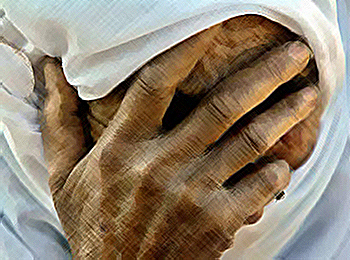|
Her Sadistic Karma(continued) Twenty years slipped away. Now I had white streaks in my beard. One
Sunday, as I was serving food in the free kitchen, I noticed one lady
who had covered her face. Only her eyes were visible. I recognized those
eyes. When the food service ended, I tagged the limping lady. She sat
on a jute mat in the corner of the huge hall, which was used by the
beggars and the homeless. I stood near her, but she concealed her face. "Amrit," I whispered. "I'm not Amrit but a poor leper." I recognized the voice. "Amrit, you can't fool me," I said. "Show me your right
arm." She wrapped her arms around her chest. I grabbed her right arm and
pointed to the tatoo. Then I placed my right arm next to hers. "We got these tatoos on the Diwali Fair, and our parents were
mad at us. Remember?" The dam controlling her emotions broke, and she cried with hiccups.
I sat near her and calmed her. Then I told her how I had gone to Lyalpur
and followed her to Kohri Village and Hira Mandi.
"What happened to you after you entered Hira Mandi?" I asked. "I tried to commit suicide three times, but failed. Like a caged
animal in a circus, I performed by job. My heart always belonged to
you. I got syphilis, and my health was ruined. The pimps no longer guarded
me, and I served as a maid servant to young whores. In 1972, I skulked
to the Ravi River. During the moon-less night, I swam the river and
entered India. I knew my end was not far off and no one would believe
my story, so I didn't try to reenter my family. I came to the Golden
Temple to atone for the sins which God forced upon me in hopes of a
peaceful end." "I'm going to take you to my home under the assumed name of Taroo
and get you proper medical treatment. You're going to live many years." "Bir, I had three years medical training and know my sickness." To change the painful topic, I asked, "Do you remember the place
in the Golden Temple where we used to meet?" "Yes, that's the only bright spot in my life," she said. "After returning, I prayed there every night." "Nothing can stop me from keeping my word with you," I said.
"Get up, and I'm going take you to my home." I pulled her up. Her body and torn clothes stank. With my help, she
tottered into my car. I told my wife the beggar lady's name was Taroo
and that she was the sister of a friend who died at Lahore during the
partition. My wife gave Amrit a good hot bath and dressed her in fresh
clothes. Amrit was merely bones, with hardly any flesh on them. I brought
a doctor, who told me she was dying. Two days after coming into my house, Amrit left her ragged, tortured
body to meet her parents. As I grasped her hand, tears channeled down
her sunken cheeks, and she left the cruel world. I was devastated. I
cremated her corpse and collected her ashes in a cotton sack. Then I
drove to the sacred river, parked my car, lifted the sack, and shambled
to the river. I stood in knee-deep water and scattered the ashes over the dancing
ripples. A beautiful, brilliant, and noble girl was thrown in a pit,
full of snakes — the religious fanatics — while
her sadistic karma merely watched her ordeal. I was glad the Yammas
(the carriers of the dead) had arrived and ended her misery. Now she
had entered the belly of the river and would join her ancestors. ADDENDUM Historical fact: More than 500,000 innocent persons — Muslims,
Hindus, and Sikhs — were butchered by the religious fanatics in
1947 riots, the worst in human history. |
